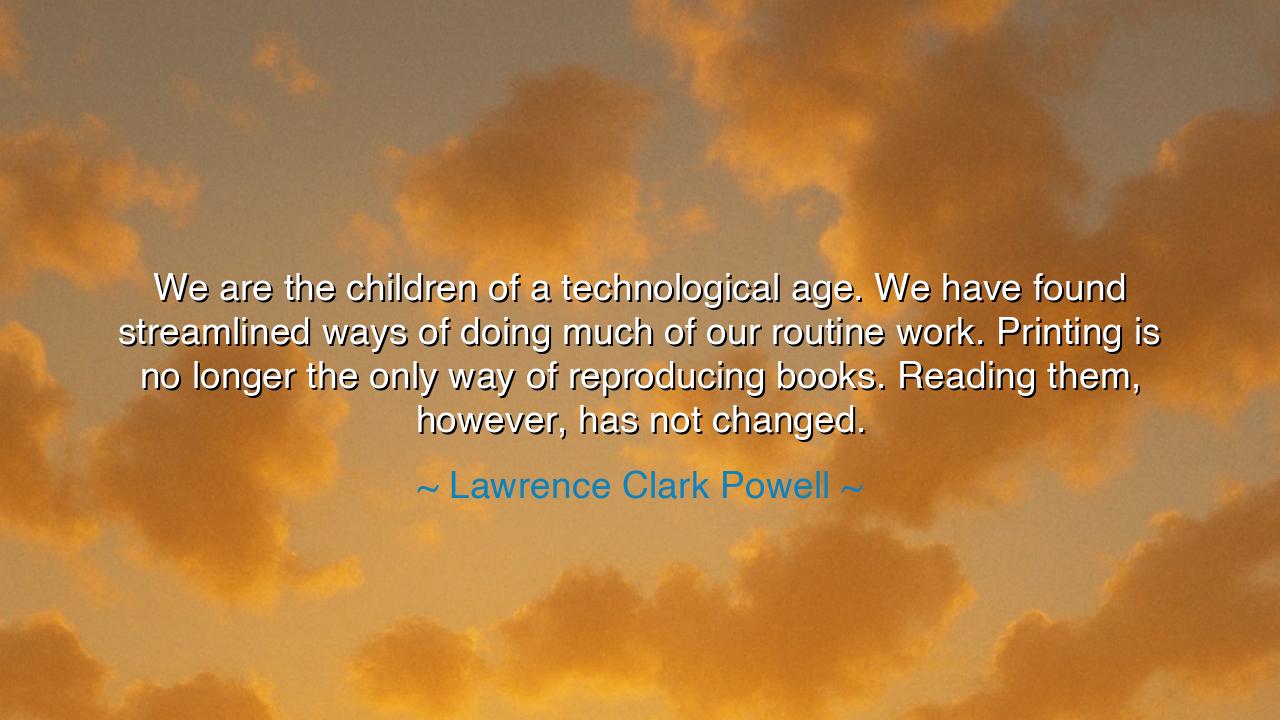
We are the children of a technological age. We have found
We are the children of a technological age. We have found streamlined ways of doing much of our routine work. Printing is no longer the only way of reproducing books. Reading them, however, has not changed.






Hear the steady and noble words of Lawrence Clark Powell, scholar and keeper of libraries, who declared: “We are the children of a technological age. We have found streamlined ways of doing much of our routine work. Printing is no longer the only way of reproducing books. Reading them, however, has not changed.” These words carry with them the fragrance of wisdom, reminding us that while the tools of men shift like sands in the wind, the essence of our encounter with truth and beauty remains unaltered.
For we live, indeed, in a technological age. Where once monks bent their backs in dim scriptoria, copying words by hand, now machines and digital presses multiply books by the thousands. Where once the book was bound in paper and ink, now it may appear on a glowing screen, summoned in an instant from distant servers. Technology has given us speed, abundance, and reach. Yet Powell reminds us that though the form of reproduction may change, the act of reading—the intimate communion between mind and word—remains untouched by time.
Consider the tale of Gutenberg and his press. Before him, books were scarce treasures, bound in leather, too precious for the common hand. With his invention, the written word burst forth into the lives of countless souls, fueling the Reformation, the Renaissance, and the birth of modern science. Yet for all this transformation, one truth endured: a man, a woman, or a child, sitting in silence with a text, is always the same, whether the words are written by hand, printed on paper, or glowing upon a screen. The vessel shifts, but the encounter does not.
The meaning of Powell’s words is not merely historical but deeply human. Technology may alter how books are carried, stored, or multiplied, but it cannot change the act of reading. To read is to enter into dialogue with another mind, to weave imagination into meaning, to let symbols transform into thought. Whether it is ink upon parchment or light upon glass, the mystery is the same: words leaping across time and space to ignite the human spirit.
Yet within these words lies also a warning. For though technology streamlines our work, it can never replace the slow labor of attention that reading requires. The danger of our age is not that books will vanish, but that minds will forget how to dwell with them deeply. Powell’s wisdom is a call to remember that progress must never strip us of patience, reflection, and the quiet fire of thought. Without these, the abundance of books becomes mere noise.
The lesson for us is clear: embrace the gifts of the age, but never lose the discipline of the past. Take the e-book, the audiobook, the digital library—but do not forget to read, to sit in silence and allow the words to shape you. For it is not the tool of reproduction that nourishes the soul, but the act of reading itself. Technology delivers the text, but it is the reader who brings it to life.
Therefore, beloved listener, take action. Make space for reading, whether on paper or on screen, not as routine, but as ritual. Guard the sacred act of entering into the mind of another through words. In this way, you honor both the ancient scribes who toiled by candlelight and the modern machines that bring you their descendants.
Thus the voice of Lawrence Clark Powell endures like a gentle bell: “Reading them, however, has not changed.” Let this truth guide you in the rush of the technological age, reminding you that beyond the press, the screen, and the algorithm, the ancient power of reading remains—the same fire that has always lit the soul of man.






AAdministratorAdministrator
Welcome, honored guests. Please leave a comment, we will respond soon